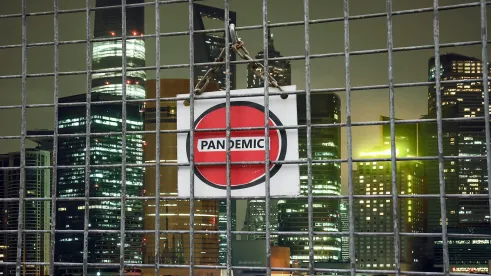The California Legislature is poised to make it even more difficult for hospitality and business service providers to operate in California. Senate Bill (SB) No. 723 amends California Labor Code Section 2810.8, which provides recall rights to certain hospitality and business services employees laid off because of COVID-19 and is scheduled to sunset in December 2024. SB 723 eliminates the sunset provision and makes Section 2810.8 permanent. SB 723 also significantly expands the pool of employees who may exercise recall rights.
Quick Hits
-
California’s current COVID-19 rehiring and retention law is set to expire December 31, 2024.
-
The law affects employers in the hospitality and building services industries.
-
If SB 723 passes the state assembly and is signed by the governor, displaced workers will be entitled to expansive rehiring rights.
Labor Code Section 2810.8
The COVID-19 pandemic significantly affected the hospitality and building services industries in California. These businesses rapidly laid off large parts of their workforces in order to survive.
On April 26, 2021, Governor Gavin Newsom signed SB 93 and created Labor Code Section 2810.8. The law requires that certain hospitality and building services employers make written job offers to employees whom they have laid off “due to a reason related to the COVID-19 pandemic.” Covered employers include hotels with fifty or more guest rooms, event centers of a certain size, airport hospitality operations, airport service providers, and employers that provide “janitorial, building maintenance, or security services” to office, retail, or other commercial buildings.
Section 2810.8 covers only employees who worked for a covered employer for “6 months or more in the 12 months preceding January 1, 2020,” and who subsequently lost their jobs during, or soon after, the COVID-19 pandemic shutdown.
If a covered employer establishes a position after a COVID-19 layoff, it first must offer the position in writing to laid-off employees within five business days of establishing the position. Employees must respond within five business days. If more than one employee responds, the employer must award the job by seniority. Employers must keep records for three years.
The California Division of Labor Standards Enforcement (DLSE) is responsible for enforcing Section 2810.8 and may order reinstatement, front and back pay, and the value of lost benefits. The DLSE may also impose substantial civil penalties and liquidated damages. Section 2810.8 is set to expire on December 31, 2024.
Proposed Changes to Current Law
SB 723 amends Labor Code Section 2810.8 in two significant ways.
First, SB 723 expands the group of covered employees to whom employers must offer recall rights. The proposed amendment eliminates the COVID-19 connection altogether, and instead covers all employees who were “employed by the employer for 6 months or more and whose most recent separation from active employment by the employer occurred on or after March 4, 2020, and was a result of a public health directive, government shutdown order, lack of business, a reduction in force, or other economic, nondisciplinary reason.” SB 723 does not apply to employees whom the employer discharged because of performance or misconduct.
Second, SB 723 makes Section 2810.8’s requirements permanent. The proposed amendment eliminates the December 2024 sunset condition. Covered hospitality and business services employers will have to comply with Section 2810.8 in perpetuity.
Impact on Covered Employers
If enacted, SB 723 may have a significant impact on covered employers. Under SB 723, covered employers will have to offer a newly created position to any covered employee laid off since March 4, 2020. Employers will bear this obligation in perpetuity, as well as the likely significant administrative burdens in complying with these obligations.
Status of SB 723
The state senate passed SB 723 on May 22, 2023, and the bill currently is pending in the state assembly. The assembly’s Committee on Labor and Committee approved SB 723 and referred it to the assembly’s Appropriations Committee in mid-June. The state assembly has until September 14, 2023, to pass the bill. If the assembly passes the bill, Governor Newsom will have until October 14, 2023, to sign or veto the bill.





 />i
/>i

